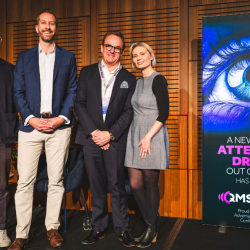Gen Z may be a single demographic group but their psychographic nuances are the key to connecting with them. In this context, brands need to embrace four, key dimensions to connect successfully with them.
For starters, Gen Z expects social relevance. To succeed, brands need to define a new social value contract with this generation. This generation needs to feel connected through an authentic brand-purpose foundation, not only centred on the product but also on societal issues such as diversity, inclusiveness and climate crisis.
Find the brand’s north star
Gen Z will also test the relevance and consistency of these brands, asking: “Why does this brand exist?”. Testing brand relevance can be sudden and often related to a societal topic such as the Black Lives Matter movement or with the climate crisis protests led by Greta Thunberg.
Of course, it is difficult to be purpose-driven from day one, such as in Formula E or Tough Mudder. It’s even more challenging to be an activist brand such as Patagonia and Ben & Jerry’s. But large and small brands alike need to define a north star with clear points of view and societal purpose that can resonate with an audience and remain consistent day after day.
Bring Gen Z into the fold
Secondly, Gen Z expects a new form of democratic interaction with brands. This democratic interaction is not a choice, it is a reality. The question is not about controlling every aspect of the interaction, it is about how to embrace and perceive it as a unique opportunity to connect with this generation.
As an example of successful democratic interaction between brands and their target audience is Overtime, a media company specializing in US Sports for the Gen Z audience. It has succeeded in leveraging user generated content (UGC) as an organic and efficient way to increase awareness and engagement with this group.
In the same way, TikTok is powerful because it’s THE Gen Z platform, combining a mobile and video first approach with an incredible pool of Gen Z creators, allowing them to remix and redefine brands using their own code and means of expression.
Target multiple identities
Thirdly, Gen Z is a ‘multi-identity’ generation. Brands need to think of GenZ through three identities:
- A Real-Life identity
- A Virtual identity, and soon
- A Virtual Assistant identity (Yes, soon Alexa will make decisions on your behalf!).
In this new paradigm, few components are key. Primarily, virtualised human experiences like gaming, VR experiences or avatars are becoming a hugely important component of Gen Z’s social lives. There has to be 24/7 access, no hurdles or judgment, new ways of self- expression and dedicated communities.
The recent success from virtual concerts like Travis on Fortnite with over 12 million concurrent views or the emergence of CGI influencers like Lil Miquela with millions of followers on social media are symbols of this new way to connect with their virtual identities.
At the same time, Gen Z is also looking for immersive real-life experiences that allow them to reconcile their digital and physical identities and create instagrammable opportunities to express their passions/interests (not only to consume a product). The recent emergence of immersive experiences like Rose Mansion, Candytopia and Electric Playbox or the growing number of experiential retail pop up stores in major cities signals the importance of going beyond the product to connect with Gen Z.
Defiant loyalty
Gen Z is also redefining brand fidelity around a new concept: Defiant loyalty. This new form of engagement is built around five key drivers. This demographic values convenience, access rather than possession, the need for an emotional connection, new sources of trust, and a willingness to be community members while protecting their singularity.
Some brands like Nike understood this shift quite well with previous generations. They built a strong direct connection with their audience while allowing a high level of personalisation (i.e. singularity). These brands are intelligently activating sources of trust (in the name of players and celebrities under contracts) to support their brand purpose and create a strong sense of community around their mission.
The five principles of the Perfect Ztorm
Winning the Customer Attention battle is the biggest challenge and opportunity that CEOs, founders, marketers, and business leaders face around the world. To achieve it and even more with GenZ, the winning brands will need to respect five fundamental principles:
- Brands need to have well-defined purpose foundations allowing them to connect around a mission
and vision with their audience as well as their employees. - They will need to have a full ownership and understanding of their customer journey that is not only related to their product but also considers how they can bring added value to customers on a daily basis.
- Brands will need to master the different facets of a customer engagement strategy. This will include well-defined editorial guidelines; supporting a holistic content strategy; and a clear new digital service innovation plan supported by a global Customer Marketing approach. Each aspect will matter.
- Strategies will have to shift from the traditional marketing plans to transmedia marketing, prioritizing frequency of touchpoints and supported by real marketing tentpoles. This includes a defined narrative, tempo and moments, a strong frequency of interactions with the audience, the ability to be always-on through content and yes, but not only, a media plan.
- Brands need to create a way to secure direct access to their audience which means prioritising a robust first party data strategy as the key foundations of a healthy and personalised direct relationship with their customer base.
With the acceleration of 5G and Artificial Intelligence, the Customer Attention economy is ushering in an era full of opportunities for brands. Gen Z is the first generation to show its full potential. We are just at the beginning of a fascinating and exciting journey.
Featured image: Callum Shaw / Unsplash































